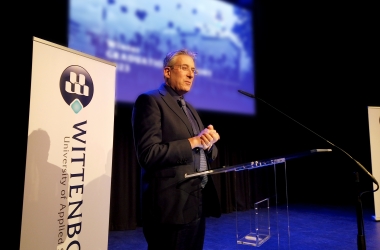Wittenborg President Points Out Limitations in MBO Manifesto
Wittenborg President Points Out Limitations in MBO Manifesto
Wittenborg President Points Out Limitations in MBO Manifesto

Peter Birdsall: Dutch educational distinctions do not exist in other countries
In a recent interview, Wittenborg President Peter Birdsall expressed reservations about the newly proposed MBO Manifesto, which aims to reshape the language used in discussions about education.
The manifesto, signed by various local and national entities, including the Municipality of Utrecht, Utrecht MBO schools, MBO student council SR030, the MBO Council and JOBmbo, calls for a reconsideration of terminology in light of Secondary Vocational Education (MBO) students who "experience negative views or discussions about their education".
JOBmbo, in a news article, states that while MBO is a valid educational choice, negative views and discussions persist, prompting the need for a linguistic shift. The MBO Manifesto urges politicians, municipalities, educators, employers and the media to be mindful of their language when discussing education and to promptly implement various changes.
The manifesto highlights the adverse impact of terms like 'higher' and 'intermediate,' contributing to a negative image of MBO.
Proposed changes include using 'educational direction', 'educational form' or 'MBO/HBO/WO education' instead of 'educational level'. The manifesto also suggests alternatives like 'MBO/HBO/WO-educated' in place of 'high-skilled' and 'low-skilled' and 'students' instead of 'MBO pupils'.
Celine van Bronswijk, a board member of JOBmbo, emphasised that MBO is no less valuable than HBO or WO. "This is partly due to language use," she wrote. "We hope that this manifesto will show people that they can use different words when it comes to Secondary Vocational Education. With this, we ultimately hope for a more equal appreciation of MBO students in our society.”
In response to the MBO Manifesto, Birdsall sees a trend in the Netherlands, potentially linked to the political climate, emphasising the importance of global interaction.
Birdsall explains that Dutch higher education distinguishes between research-oriented higher education (wetenschappelijk onderwijs, WO) and higher professional education (hoger beroepsonderwijs, HBO). HBO is more oriented towards professions in specific areas than WO, and has traditionally been offered at universities of applied sciences (hogescholen).
"As soon as you cross the border, I'm afraid what you have is called a 'bachelor's'. And the same goes for a master's degree."
Birdsall explains that the Dutch are determined to maintain their binary system of education division, which differs significantly from international practices. "There has never been such a division on the global stage, and there are no plans to create one. Therefore, for international business schools or universities, it would be complete madness to start losing the concept of how highly qualified you are. Abroad, distinctions lie between bachelor, master, postgraduate or doctoral levels, without the intricacies seen in the Dutch system."
He warns against abandoning the concept of qualification levels, stressing the impact on employability.
"While qualifications don't determine everyday skills, they significantly influence professional opportunities. Employers are always going to ask 'What is your level of education?' That's just the world's way of doing it.”
Birdsall, therefore, advocates for recognising educational nuances and maintaining distinctions in a globalised context, asserting that the Dutch language's "inward-looking nature may hinder international understanding and collaboration".
WUP 29/12/2023
by Erene Roux
©WUAS Press
531 words